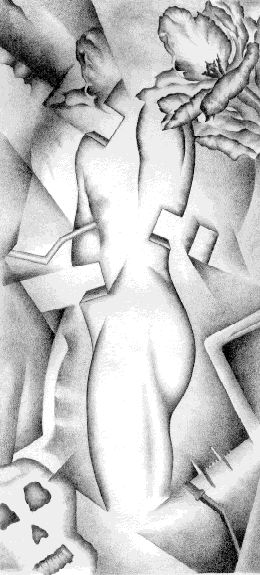


By Emily Harrison Weir
Illustration by Patricia Czepiel Hayes '84
Ask Americans if they favor organ transplants, and as many as 90 percent
will say yes. But only about 19,000 organs were available last year for
the 37,000 patients on the national transplant waiting list. If people agree
in principle, why do they shy away in practice, despite obvious need and
massive campaigns to encourage organ donation?
Associate professor Don Joralemon has been considering this question from
an
anthropologist's point of view. "Americans say things like 'The heart's
just a pump,' but our actions contradict that belief," he says. "When
I read the medical literature on transplantation, I found we don't have
as scientifically neutral a view of the body as we sometimes pretend."
Joralemon says something in our culture-and in many others worldwide-binds
our sense of self closely to our physical selves.
The biological boundary between your body and everyone else's is fixed and
permanent. Transplant recipients' bodies will always attack donor tissue
as foreign matter unless strong anti-rejection drugs suppress this reaction.
Joralemon wonders if efforts to convince people to "recycle" their
organs are the cultural equivalents of these anti-rejection drugs, attempting
to suppress a widespread belief that sharing body parts might mean losing
part of your spirit, too.
He hasn't reached a conclusion yet, but preliminary cross-cultural evidence
indicates that transplants may violate a basic human bond between body and
spirit. Consider the cultural resistance to transplantation embedded in
these disparate situations:
These examples support Joralemon's hunch that the public isn't as ready
to accept transplantation as widely cited polling data implies. "The
conflict emerges from unresolved tension between two Western views,"
he explains: the idea of the body as a "thing" sustained by medical
technology and the idea of the body as an inextricable part of the self.
Joralemon started thinking about resistance to transplantation as a cultural
phenomenon nearly three decades ago. "I remember clearly when Christiaan
Barnard performed the first heart transplant and when Barney Clark got the
first mechanical heart," he says. "Those dramatic moments struck
me as even more significant culturally than as the medical miracles they
were presented to be. And I've always been interested in the degree to which
medical technology runs faster than our culture's ability to integrate it."
Joralemon is also studying how the medical community measures transplant
recipients' quality of life. With organs in short supply and some operations
costing several hundred thousand dollars each, "it's not enough just
to count patients' years of life," he explains. "You also must
prove that patients thrive." To evaluate this, recipients typically
fill out standardized questionnaires, often in the hospital where the transplant
was performed. Joralemon says this is only one of many reasons that current
assessments yield skewed results, which are reflected in the medical literature's
"extraordinarily rosy picture of the outcome of organ transplantation."
He believes a better way to study something as complex and culturally variable
as "quality of life" is through long-term, multiple-visit interviews
conducted by researchers not affiliated with patients' medical care-such
asanthropologists. This approach, according to Joralemon, can provide "the
deeply textured information about the roller coaster of recipients' lives"
necessary to inform public-policy decisions and to help prospective organ
recipients weigh the pros and cons of the surgery and its aftermath.
Sophomore Kim Fujinaga became Joralemon's valued assistant in this research.
Working side by side, they gathered and analyzed the relevant literature,
and Fujinaga critiqued medical studies' experimental methods and prepared
a graphic presentation of data that Joralemon used at a professional meeting.
He has already conducted several extensive quality-of-life interviews with
transplant recipients and hopes to do so on a larger scale after finishing
some theoretical work in this emerging field of medical anthropology.
While it's still early in his research, Joralemon says, "Transplantation
is not as simple an issue as the organ transplant community would like us
to believe. In fact, there's a great deal of cultural resistance all around
the world. Whatever our personal position on transplantation might be, we
at least need to recognize this is happening."